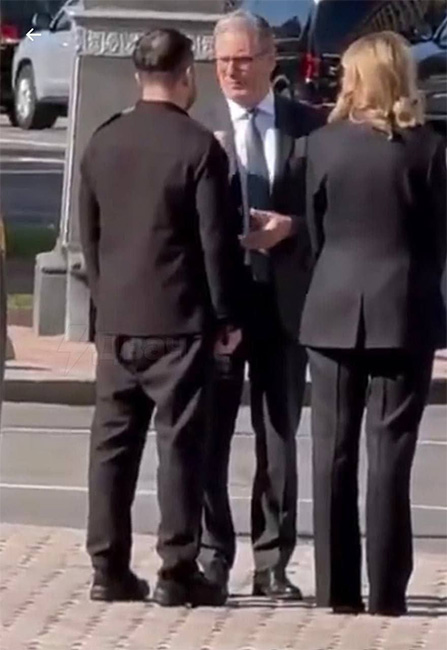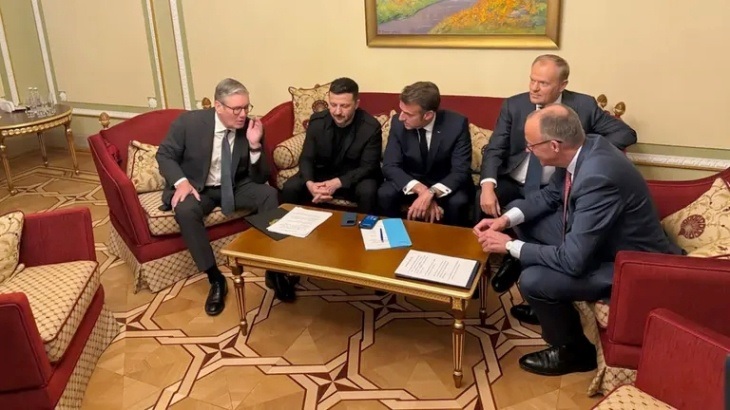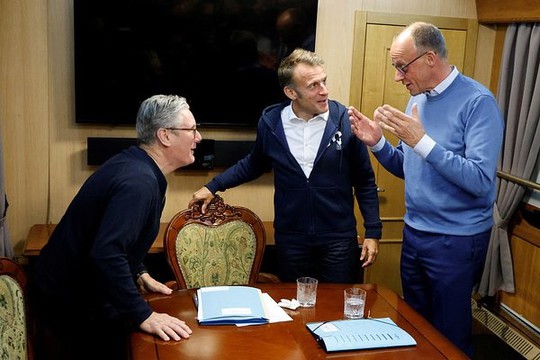‘Most powerful’ European leaders go to Kyiv by ‘special train’.
Photo: DW
Donald Trump’s social media post insisting Ukraine must immediately start peace talks with Russia has set back, and possibly jeopardised, Europe’s carefully laid plans to persuade the US to impose sanctions on Moscow for refusing the US president’s proposal for a 30-day ceasefire, European diplomats have said, writes ‘The Guardian’.
Volodymyr Zelenskyy had no choice but to accept Vladimir Putin’s invitation to talks in Istanbul on Thursday for fear of offending Trump, diplomats said. Putin made the offer in a bid not to alienate the US president, and avoid the growing European pressure on Trump to impose harsher sanctions. Western diplomats say they have no reason to believe that Trump acted in collusion with the Russian leader.
 Zelenskyy with Starmer in Kyiv.
Zelenskyy with Starmer in Kyiv.
Photo: publics
The leaders of Britain, France, Germany and Poland had for the first time gone together to Kyiv at the weekend to underline the call for a 30-day ceasefire that they said should start on Monday.
The aim of the visit by Keir Starmer, Emmanuel Macron, Friedrich Merz and Donald Tusk was to put pressure on Trump to admit that Putin was stalling, and that the US had no political option but to put swinging economic sanctions on Russia.
 Keir Starmer, Emmanuel Macron, Friedrich Merz and Donald Tusk in Kyiv.
Keir Starmer, Emmanuel Macron, Friedrich Merz and Donald Tusk in Kyiv.
Photo: Reuters
Partly due to Trump’s intervention, the UK has now postponed further measures due to be announced on Monday, but the EU is continuing with its plans for another package of sanctions later this month. A German government spokesman said on Monday that the EU would begin working on the sanctions if there was not a ceasefire by the end of the day.
On Sunday, Trump issued a statement on his Truth Social website. He said Ukraine should agree to meet Russia immediately. “At least they will be able to determine whether or not a deal is possible,” Trump wrote. “If it is not, European leaders, and the US, will know where everything stands, and can proceed accordingly!” Trump said he was “starting to doubt that Ukraine will make a deal with Putin”.
The Kremlin spokesperson, Dmitry Peskov, on Monday did not directly answer questions on talks with Zelenskyy, saying instead the Kremlin was “focused on a serious search for ways to achieve a long-term peaceful settlement”. Peskov also criticised what he called EU “ultimatums” over Ukraine in a conference call with reporters. “The language of ultimatums is unacceptable to Russia, it is not appropriate. You cannot talk to Russia in such a language,” he said.
On Monday Trump suggested Putin would attend and that he himself might take part. “You may have a good result out of the Thursday meeting in Turkey… and I believe the two leaders are going to be there. I was thinking about flying over. I don’t know where I am going be on Thursday, I’ve got so many meetings… There’s a possibility there I guess if I think things can happen.”
Marco Rubio, the US secretary of state, will also be in Turkey on Thursday for an informal summit on overall NATO defence spending, but European ministers intend to discuss their view that Russia’s terms for a peace deal effectively involve the dismemberment of Ukraine.
If Putin is seen to be delaying a ceasefire, or the talks break down in Istanbul, the aim will be to go back to Trump and urge him to recognise Putin is not interested in a peace, and only Ukrainian capitulation.
Maria Zakharova said Ukraine had “misread” Putin’s statement. The Russian foreign ministry spokesperson told state newswire TASS: “Putin said it very clearly: negotiations about the initial reasons [for the war] first, then a conversation about a ceasefire.”
Russia’s demands include a bar on NATO membership for Ukraine and recognition of Putin’s annexation of four south-eastern regions, as well as an end to western military support for Kyiv.
read more in our Telegram-channel https://t.me/The_International_Affairs

 11:39 13.05.2025 •
11:39 13.05.2025 •























